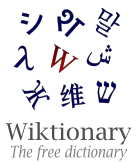Table Of Contents
- Adjective Inflection In Gender
- Adjective Inflection In Plural
- Adjective Inflection In Case
- Comparative And Superlative
- The short form
Russian adjectives are placed before the substantive they describe. Adjectives follow the gender, case and plurality of the substantive.
Adjective Inflection In Gender
The suffix after adjective's stem is -ая or -яя before feminines and -ое or -ее before neuters. The masculine suffix is either -ый or -ий, or -о́й. The last kinds of adjectives are few in numbers but great in frequency as they are some of the most common adjectives in Russian texts. In table below, deviations from -ая, -ый and -ое are marked with grey.
| Common | Exceptions | ||||
|---|---|---|---|---|---|
| Regular Adjectives | Stem ends in г, к, х |
Stem ends in ж, ч, ш, щ |
Soft stem adjectives | Ending in -о́й | |
| Masculine | красный стул red chair |
глубокий рубец deep scar |
хороший вопрос good question |
синий стул blue chair |
большой волк big wolf |
| Feminine | красная машина red car |
глубокая шахта deep mine shaft |
хорошая попытка good attempt |
синяя машина blue car |
большая проблема big problem |
| Neuter | красное море Red Sea |
глубокое замораживание deep-freezing |
хорошее решение good solution |
синее море blue sea |
большое окно big window |
Adjective Inflection In Plurality
| Common | Exceptions | ||||
|---|---|---|---|---|---|
| Regular Adjectives | Stem ends in г, к, х |
Stem ends in ж, ч, ш, щ |
Soft stem adjectives | Ending in -ой | |
| Singular Masculine | красный стул red chair |
глубокий рубец deep scar |
хороший ответ good anwser |
синий стул blue chair |
большой волк big wolf |
| Plural (any and all genders) |
красные машины red cars |
глубокие шахты deep mine shafts |
хорошие вопросы good questions |
синие машины blue cars |
большие окна big windows |
Adjective Inflection In Case
Adjectives are inflected in the same 6 cases as substantives, following the case of the noun.
Regular adjectives:
| Case | Suffix | Example | In English |
|---|---|---|---|
| Nominative | -ый (masculine) |
Э́то
бы́л
по́лный
успех.
|
It was a complete success.  |
| -ая (feminine) |
ка́ждая
ко́мната
была́
тща́тельно
обыскана.
|
Every room was searched thoroughly.  |
|
| -ое (neuter) |
молодо́е
поколе́ние
смо́трит
на́
жи́знь
иначе.
|
The younger generation looks at things differently.  |
|
| -ые (plural) |
У
вас
руки
чистые?
|
Are your hands clean?  |
|
| Genitive | -ого (m.) |
Мы
ра́зного
роста.
Он
вы́ше
меня.
|
We are different heights. He is taller than me.  |
| -ой (f.) |
Я
страдаю
от
си́льной
простуды.
|
I am suffering from a bad cold. | |
| -ого (n.) |
Э́тот
бриллиа́нт
сто́ит
це́лого
состояния.
|
This diamond costs a fortune.  |
|
| -ых (pl.) |
Гла́за
должны
бы́ть
защищены
от
попада́ния
прямы́х
со́лнечных
лучей.
|
You should protect your eyes from direct sunlight.  |
|
| Feminine accusative | -ую (f.) |
Думаю,
они́
проде́лали
хоро́шую
работу.
|
I think they've done a good job (inanimate).  |
|
Ка́к
зовут
Вашу
ста́ршую
сестру?
|
What's your older sister's (animate) name?  |
||
| Neuter accusative | -ое (n.) |
Я
оказа́лся
в
ну́жном
ме́сте
в
ну́жное
время.
|
I was in the right place at the right time (inanimate).  |
| Masculine Accusative | As nominative (inanimate) |
То́м
хо́чет
купи́ть
но́вый
смартфон.
|
Tom wants to buy a new smartphone (inanimate).  |
| As genitive (animate) |
мы
бегали,
когда́
мы
уви́дели
яростого
медведя.
|
When we saw an angry bear (animate) we ran. | |
| Plural Accusative | As nominative (inanimate) |
Я
люблю́
наро́дные
песни.
|
I like folk songs (inanimate).  |
| As genitive (animate) |
Я
ре́дко
встреча́л
таки́х
интере́сных
женщин,
ка́к
ты!
|
I rarely meet such an interesting woman (animate) as you!  |
|
| Dative | -ому (m.) |
Доверяя
ему,
ты
подверга́ешь
себя́
большо́му
риску.
|
You're running a big risk in trusting him.  |
| -ой (f.) |
Те́
ту́фли
подхо́дят
к
э́той
бе́лой
юбке.
|
Those shoes go well with this white skirt.  |
|
| -ому (n.) |
Пойдёмте-ка
к
э́тому
высокому
дереву.
|
Let's head for that tall tree.  |
|
| -ым (pl.) |
Я
живу
по
со́бственным
правилам.
|
I live by my own rules.  |
|
| Instrumental | -ым (m.) |
Мэри
беременна
вторы́м
ребёнком.
|
Mary is pregnant with her second child.  |
| -ой (f.) |
Посмо́трите
на́
до́м
с
кра́сной
крышей.
|
Look at the house with the red roof.  |
|
| -ым (n.) |
Аспири́н
мо́жет
служи́ть
бы́стрым
облегче́нием
головно́й
боли.
|
Aspirin serves as a quick relief for a headache.  |
|
| -ыми (pl.) |
О́чень
ча́сто
в
америка́нских
видеоиграх
ру́сских
пока́зывают
гла́вными
злодеями.
|
In American video games Russians are often being shown as the main villains.  |
|
| Prepositional | -ом (m.) |
То́м
в
про́шлом
ме́сяце
ушёл
с
работы.
|
Tom quit his job last month.  |
| -ой (f.) |
Я
живу
в
маленькой
квартире.
|
I live in a small apartment.  |
|
| -ом (n.) |
До́ка
во
все́х
ремёслах -
ма́стер
в
никаком.
|
Jack of all trades is a master of none.  |
|
| -ых (pl.) |
Све́дения
о
вое́нных
де́йствиях
держа́лись
в
секрете.
|
They kept the information about the military operations a secret.  |
For irregularly inflected adjectives, the case inflection is presented in the case pages.
Comparative And Superlative
Russian adjectives have three degrees of comparison: positive, comparative (more-form) and superlative (the most-form.) In addition there is наи-prefix for emphasizing superlative ("the most of all").
The most common adjectives have irregular comparative and superlative forms like the English "good better best". Comparative and superlative forms are easy to identify when reading, but when writing but you usually need a dictionary to check the exact form.
| Form | Marker | Example | In English |
|---|---|---|---|
| Positive | длинный красивый |
||
| Comparative | длиннее |
Когда́
прихо́дит
весна,
дни
стано́вятся
все
длиннее
и
длиннее.
|
When spring comes, the days get longer by the day.  |
| красивей |
Я
знаю,
что́
Мэри
красивей
меня.
|
I know that Maria is prettier than me.  |
|
| Superlative -ей -чай -жай |
длиннейший |
Река́
Амазонка -
длинне́йшая
в
мире.
|
Amazon is the longest river in the world. |
| наидлиннейший |
наидлиннейшая
о́бщая
подпоследовательность
|
the longest common subsequence | |
| глубочайший |
Я
принёс
глубоча́йшие
извинения.
|
I apologized profusely (deeply.)  |
|
| наиярчайший |
Солнце -
наиярчайшая
звезда.
|
The sun is the brightest star.  |
As a fallback you can form all degrees of comparison with separate words (more, most, less, least). You get the message across with these in all situations, but they are stylistically clumsy if your adjective does have proper lexical comparative and superlative forms.
| Form | Marker | Example | In English |
|---|---|---|---|
| Positive | |||
| Comparative | более (more) |
Нам
нужно
обсудить
бо́лее
ва́жные
вещи.
|
We have more important things we need to discuss.  |
| менее (less) |
Подо́бные
руково́дства
сле́дует
писа́ть
ме́нее
сло́жным
языком.
|
Such manuals should be written in simpler language.  |
|
| Superlative | самый (the most) Inflected like an adjective |
Думаю,
э́то
са́мый
лу́чший
ответ.
|
I think that's the best answer.  |
| наиболее (most) |
Газе́та
публику́ет
наибо́лее
ва́жные
факты.
|
The newspaper publishes the most important facts.  |
|
| наименее (least) |
В
1950-х
писалось,
что́
в
ми́ре
дие́та
финнов -
одна́
из
наиме́нее
полезных.
|
In the 1950's, the Finns were cited as having one of the least healthy diets in the world.  |
Самый is inflected like a regular adjective, while the other comparison words are uninflected.
As A Narcissist, I Am The Best Of All And Definitely Better Than You
Often comparative compares a base object to a target of comparison. There are two construction to do this. Чем + nominative acts the same way as the English than-clause.



In very simple comparisons, the target of comparison can be in genitive.




In superlative, the reference group is expressed with many different constructions: Relative pronouns ("The best, which I've seen..."), location expressions ("the best in the world") or reference group ("the best out of ten")



The Short Form
The short forms are used only in nominative case when the adjective serves as a predicative expression. Predicative sentences have "to be" as their verb. For example if we say "The car is blue", then "The car" is the subject and "blue" is a predicative expression. In Russian predicative expressions, "to be" verb is omitted in present form ("The car is blue") but present in other tenses ("The car was blue" or "The car will be blue".)
Note that many predicative expressions use non-nominative forms. Short for is only for nominative.
| Name | Suffix | Example Sentence | In English |
|---|---|---|---|
| Masculine nominative | красивый | ||
| Short form: Masculine | красив |
Она́
понимала,
что́
он
прав.
|
She understood that he was right. |
| Short form: Feminine | красива |
Она́
ещё
доста́точно
молода,
чтобы
рожа́ть
сыновей.
|
She is still young enough to bear children. |
| Short form: Neuter | красиво |
Окно́
бы́л
откры́то
и
пти́ца
прилетела.
|
The window was open and a bird flew in. |
| Short form: Plural | красивы |
Худо́жником
созданы
три
произведения.
|
Three works were created by the artist. |
If the adjective stem ends in two consonants, -о / -е is placed between the consonants in the short masculine form.
| Name | Suffix | Example Sentence | In English |
|---|---|---|---|
| Masculine nominative | длинный | ||
| Short form: Masculine | длинен |
Мо́й
во́лос
бы́л
длинен,
когда́
я
слу́шал
метал.
|
My hair used to be long when I still listened to metal. |
| Short form: Feminine | длинна |
Сосна́
сли́шком
длинна,
поэ́тому
он
повали́л
её.
|
The pine was too tall, therefore he felled it. |
| Short form: Neuter | длинно | Теперь расстояние достаточно длинно, чтобы ничего услушает твои крики. | Now we're far enough that nobody will hear you screams. |
| Short form: Plural | длинны |
Его́
ле́кции
о́чень
длинны.
|
His lectures are very long.  |
| Name | Suffix | Example Sentence | In English |
|---|---|---|---|
| Masculine nominative | короткий | ||
| Short form: Masculine | короток |
Интерва́л
о́чень
короток,
у
на́
нет
времен
курить.
|
The pause is very short, we don't have time to smoke. |
| Short form: Feminine | коротка |
Ка́к
коротка
жизнь!
|
How short life is! |
| Short form: Neuter | коротко |
Де́рево
ещё
коротко.
|
The tree is still short. |
| Short form: Plural | коротки |
Когда́
де́ти
коротки,
они́
постоя́нно
выраста́ют
из
их
одежд.
|
When children are short they grow out of their clothes all the time. |




